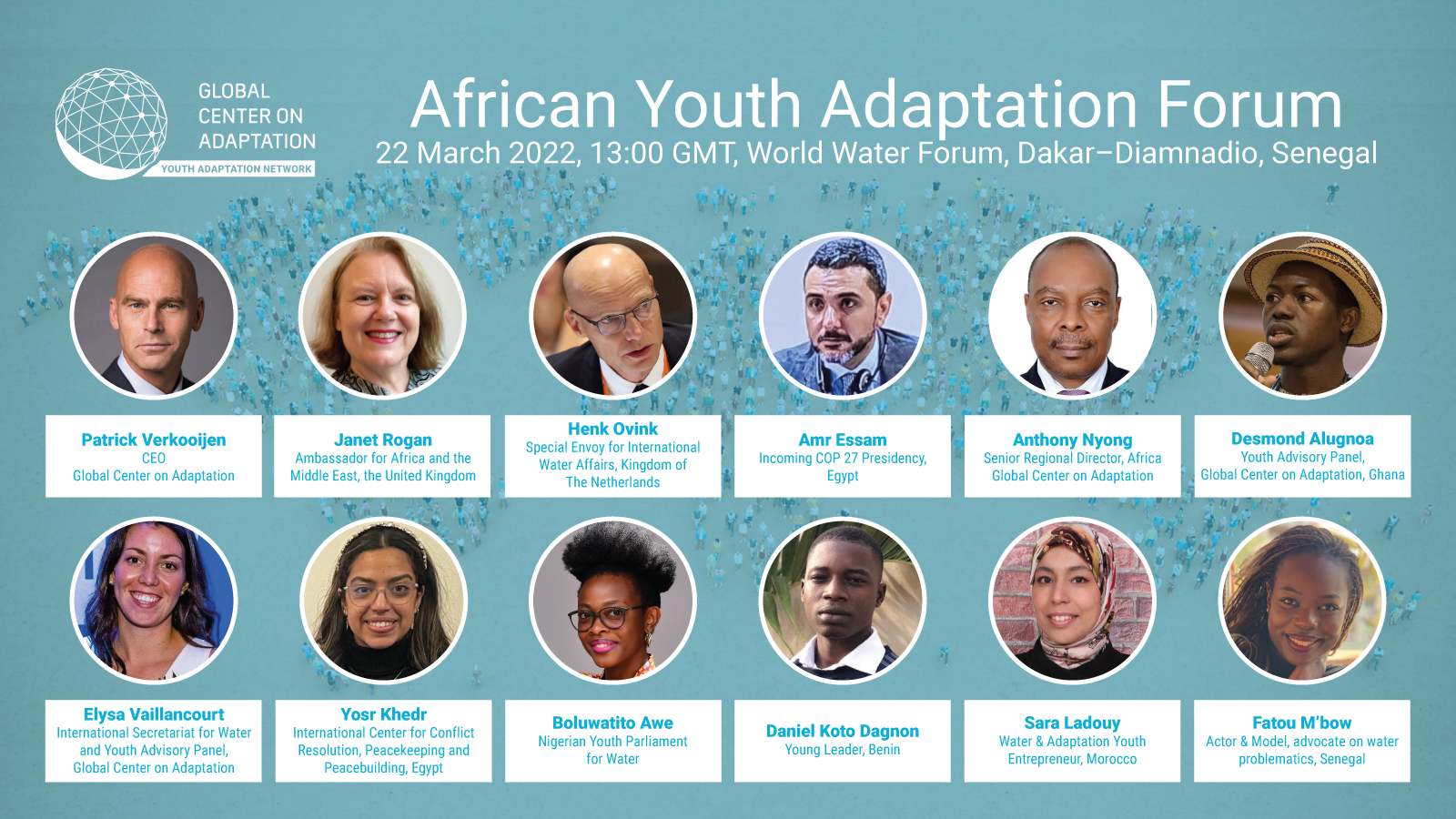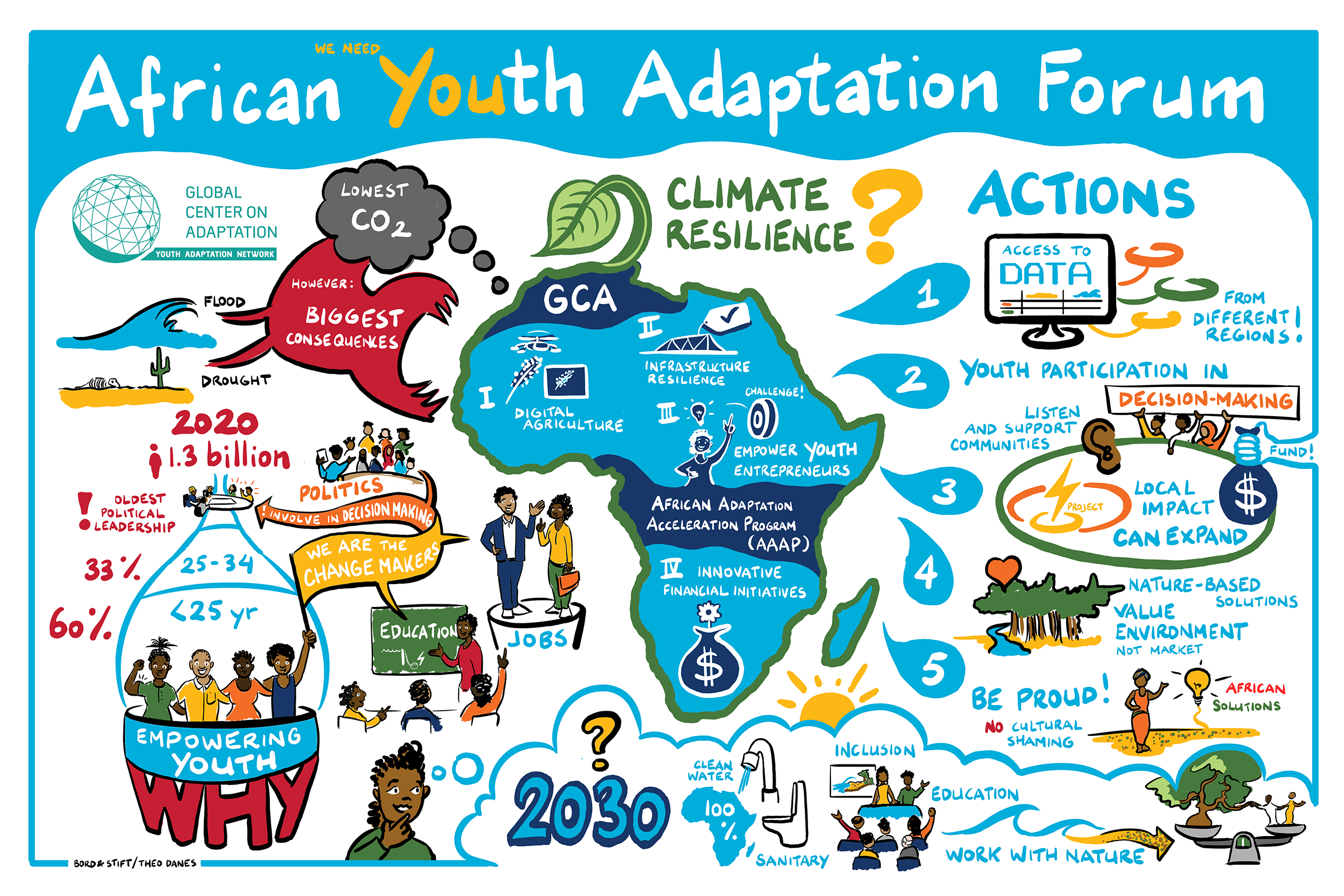GCA holds First African Youth Adaptation Forum at the World Water Forum in Senegal
The African Youth Adaptation Forum brought together decision-makers and youth representatives to discuss and identify youth priorities and recommendations on the review of the Global Goal on Adaptation.
T
he first African Youth Adaptation Forum took place at the World Water Forum in Senegal on 22nd March. Decision-makers and young people discussed youth priorities and actions in adaptation. The African Youth Adaptation Forum is the first in a series of six Regional Youth Adaptation Forums and a Global Youth Adaptation Summit that identifies youth recommendations on the review of the Global Goal on Adaptation. These youth inputs will culminate in a publication by the Global Center on Adaptation (GCA), ‘Youth Recommendations on the Global Goal on Adaptation’, and will be shared with decision-makers at global forums, including the Friends of GCA High-Level Dialogue in September, and at the African COP27 in Egypt to bring youth voices to adaptation decision-making.
The Forum was organized by GCA’s Youth Advisory Panel, and brought together youth speakers as well as institutional representatives. The young leaders participating were:
- Mr. Desmond Alugnoa from Ghana and Ms. Elysa Vaillancourt from Canada, members of GCA’s Youth Advisory Panel,
- Ms. Yosr Khedr, International Center for Conflict Resolution, Peacekeeping and Peacebuilding from Egypt,
- Ms. Boluwatito Awe, representative of the Nigerian Youth Parliament for Water,
- Ms. Sara Ladouy, a water and adaptation entrepreneur from Morocco, and
- Ms. Fatou M’bow, a water advocate from Senegal.
- Mr. Daniel Koto Dagnon, Network of World Youth Parliament for Water, Benin
Institutional speakers included:
- Dr. Julian Wright, Senior Advisor for Climate Change and Natural Resources of the United Kingdom Foreign and Commonwealth Development Office,
- H.E. Henk Ovink, the Special Envoy for International Water Affairs from the Netherlands, and
- Dr. Anthony Nyong, GCA’s Senior Director Africa
Statements were delivered by Prof. Dr. Patrick Verkooijen, GCA CEO; Mr. Youssef Nassef, UNFCCC’s Adaptation Director; and Mr. Amr Essam, Representative of the COP27 Presidency, through video messages. The Forum had over twenty youth participating in the audience and nearly one hundred participants joined online.

Speakers at the African Youth Adaptation Forum
The African Youth Adaptation Forum aimed to:
- Identify youth priorities and recommendations on the Global Goal on Adaptation
- Promote youth participation in adaptation policy and decision-making processes
- Accelerate adaptation action by showcasing youth-led climate-resilient solutions including the YouthADAPT Solutions Challenge winners
Intergenerational Dialogue on the Role of Youth in Adaptation
In the Intergenerational Dialogue on the Role of Youth in Adaptation, young leaders Mr. Alugnoa and Ms. Yosr Khedr spoke with government representatives Dr. Julian Wright and Mr. Ovink, and with Dr. Nyong about the challenges and priorities for young people to engage in adaption action and policymaking, as well as the role of governments to meaningfully engage in adaptation policy-making.
90% of the impacts of climate change come through water. 100% of the solutions come through water.
Henk Ovink
Special Envoy for International Water Affairs, Kingdom of the Netherlands
During the discussion all speakers underlined the fact that climate change exacerbates the already existing tensions experienced by the most vulnerable and marginalized communities including women and youth. We need to consider the problems and opportunities that young people are facing in Africa to ensure inclusive adaptation action and policy making.
One of the main priorities for youth in Africa identified in this Forum is bridging the gap related to inadequate job opportunities. As mentioned by Mr. Nyong, 12 million young professionals are entering the job market in Africa every year and we must create jobs in all projects related to water and climate adaptation. The importance of fostering and supporting entrepreneurship in the climate adaptation sector was also identified as a key priority. The Africa Adaptation Acceleration Program (AAAP), led jointly by GCA and the African Development Bank, is a concrete initiative to address this gap.
Adaptation action should follow a nationally driven gender and youth responsive participatory and fully transparent approach.
Yosr Khedr
International Center for Conflict Resolutions, Peacekeeping and Peacebuilding, Egypt
Furthermore, youth face the challenge of the absence of clear communication channels between youth organizations and local government and authorities, as well as insufficient and inadequate financing mechanisms. Youth must receive the financial and technical resources needed to act locally and access key leadership positions.
As mentioned by Mr. Ovink, “Youth need to provoke me and my generation to make sure that we stop doing everything that doesn’t work and start to invest and scale everything that does work”. The voice of youth is of critical importance and government officials need to partner with youth to raise their ambition and to help change the course of action.
Showcasing Youth-Led Adaptation Solutions
During the session, youth-led adaptation solutions were showcased by four young change-makers and entrepreneurs. They shared the adaptation solutions that they are leading and lessons learned.
Sara Ladouy, a young entrepreneur from Morocco, founded Rais’eau, a start-up which aims to minimize water consumption by redefining water recycling in households. Rais’Eau aims to introduce students and graduates to environmental and social problems. To this day, Ladouy’s project has reduced the consumption of 1000m3 of water in households and has supported 9 graduate students who have launched 6 prototypes to reduce water consumption.
In Benin, Daniel Dagnon is working on the project #TonFuturTonClimat which aims to improve the sustainable management of natural resources of the Tchoutchoubou micro-basin in the Pendjari basin by empowering young people. Both projects presented by Sara Ladouy and Daniel Dagnon are concrete examples of nature-based solutions that are being led by youth to support the creation of jobs and entrepreneurship in the climate adaptation sphere.
Regarding the challenge related to advocacy and influencing of decision-makers, Fatou M’bow mentioned that youth must be included at the concept stage of policy-making and project development. For this, Fatou is working alongside her colleagues at the World Youth Parliament for Water to strengthen the cohesion and outreach of the youth-voices in Africa by creating a dedicated African Youth Parliament for Water. In addition, Fatou mentioned access to data as a key point to improve decision-making.
Furthermore, to influence decision-making processes and foster change, communication is essential. Boluwatito Awe, President of the Nigerian Youth Parliament for Water, presented the work that she is doing to change people’s behaviors through communication. She is working to provide opportunities for the youth to enable them to push the water and climate agenda in an integrated manner wherever it be in their schools, organizations or work environment.
As a key lesson learned, the importance of valuing diversity, cultural heritage and knowledge in all adaptation solutions was identified by all panelists.
Designing a climate-resilient Africa post 2030
To conclude the session, the audience shared a powerful vision of a climate-resilient Africa post 2030, identified key transformational changes needed and shared their priorities for the Global Goal on Adaptation.
Our vision included clean water for all; education for all, especially women and girls; access to data; an inherently valued environment; youth and women form part of decision-making.
The 5 key actions needed to achieve this vision are:
- Collaboration between and amongst youth and decision-makers
- Access to technology
- Investing in nature-based solutions
- Investing in youth entrepreneurship
We envision a world in which we stop talking and start acting in an inclusive manner by giving the most vulnerable and marginalized communities the power to act. This includes ensuring that women and youth are not only included in decision making processes but more importantly ensuring that they have the capacities and tools to be influence the decisions that most affect them. Participants also envision a world in which everyone, especially women in rural communities, have access to water and sanitation.

Visual summary of the discussion at the African Youth Adaptation Forum
Watch the Forum here.
The Pacific Youth Adaptation Forum will take place next on 28th April 2022. Register here.
For more information on the Regional Youth Adaptation Forums, please contact Ms. Adriana Valenzuela, Youth Leadership & Education Program Lead, at youth@gca.org.